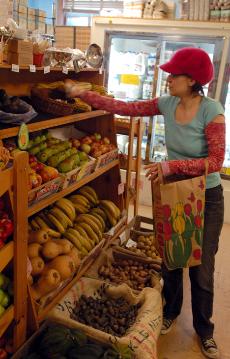Organic market promotes local produce farmers
November 15, 2006
Tired of taking care of crabby and cranky kids, Anne Troland gave children at the after school program where she worked whole wheat peanut butter and jelly sandwiches to replace Twinkies and Skittles.
The results led Troland, front-end manager of the Common Ground food co-op, to start educating people about eating well.
The Common Ground food co-op, 610 E. Springfield Ave., sells organic and natural products grown and made in and around the Champaign area, from bananas to organic penne pasta to crunchy almond butter and a variety of toiletries such as lotion and lip balm.
“It makes a lot of sense,” Troland said. “You know the people who are producing your food. We know all the farmers, we can go to their farms and see how they are treating their animals and growing their food.”
The co-op plays a big part in increasing the health of the local community, said Clint Popetz, chair of the co-op’s board of directors.
Get The Daily Illini in your inbox!
“The environment is improved when we grow food organically,” Popetz said. “When we buy food from local organic producers we support a local economy.”
In order to shop at the co-op, one must become a member after the first couple visits to the store for a fee of $30. Members are then able to make decisions concerning the co-op.
“We want to give people the opportunity to check out the co-op,” said Meagan Luhrs, front-end staff member. “Of course we’d prefer for people to become members. That’s the whole idea, to be involved.”
However, membership may not be required for shopping in the future.
Popetz said that selling to non-members makes membership more meaningful.
“You don’t become a member just to shop, it means you think hard about what membership means,” Popetz said. “It allows us to attract people who would shop there but would not initially want to become members, but might want to be along the road.”
For Nora Miller, a member of the co-op, requiring membership to shop is what she said separates the co-op from other grocery stores.
“It’s not just a nameless store,” Miller said. “It’s your store.”
The co-op is a business, but it only charges enough money to meet the costs of maintaining the store. Still, the food is not cheap since the co-op supports small farms that do not produce food in large quantities.
“We are supporting quality, which is often sacrificed when you’re going for quantity,” Troland said.
Currently, the co-op is not selling meat. Troland said that while some members want meat to be on the shelves, another group is opposed.
“I personally would like for us to carry meat,” Luhrs said. “If people are going to eat meat, we would want to have a good, organic option for them. It’s also a good way to support the local farmers.”
Although Popetz does not have a personal preference, he would support selling meat if it helped the co-op achieve its goals.
“(Farmers) can make more money selling meat than selling vegetables,” Popetz said. “Another reason to do it is we can attract a larger sector of people who want to buy all their groceries in one spot. We definitely don’t want to alienate a large portion of our membership, and I don’t think that would be the case.”







